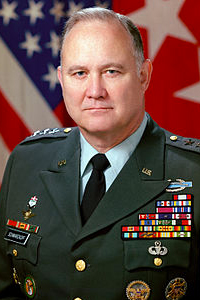Norman Schwarzkopf
In 1988, when I was President Reagan’s national security adviser, we were selecting a new commander for Central Command. The initial Pentagon recommendation was a superb Navy admiral. But we wondered if an admiral was the right choice.
The Iran-Iraq war had just ended in a cease-fire, and the huge Iraqi army now had the flexibility to look for trouble elsewhere It seemed to us that if trouble broke out and we got involved, it would primarily be a joint ground conflict, and it seemed more logical to have a ground commander. Norm was selected to be that commander.
A year later, I became chairman of the Joint Chiefs of Staff, and Norm and I finally worked together under then-Secretary Dick Cheney. The end of the Soviet Union was in sight. We had to get ready to reduce our Cold War size, change our strategy and give back to the American people.
You can imagine the bureaucratic challenges we faced. Of all the terrific combatant commanders we had at that time, it was Gen. Schwarzkopf who had the greatest understanding of the need to change. He was an indispensible adviser as we made our case for a sensible reduction to a smaller but fully capable force.
Then, on Aug. 2, 1990, Iraq invaded Kuwait. Norm and his staff had been considering the possibility of an Iraq attack in the region and had been preparing contingency plans.
We assembled with President Bush and his war cabinet at Camp David. After much discussion, Norm laid out the contingency plans he was working on, now updated in light of the invasion.
Although execution would be challenging, the plan he laid out that day eventually became Operations Desert Shield and Desert Storm. Armed with that plan, President Bush was able to say to the world, “This will not stand, this aggression against Kuwait.”
It would take me hours to describe all that Norm and his troops did in the six months that followed. With contributions from three dozen countries, he created and led a force of almost 700,000 troops to drive the Iraqis out of Kuwait. It’s hard to believe now that there were even Egyptian and Syrian forces under Norm’s command. The international community was united.
Norm’s diplomatic skills and experience from living in the area as a young man made him an expert in working with the leaders in the region. He could drink tea and sit with the best of them.
Schwarzkopf gained the confidence of the coalition leaders, and they were full partners and allies in the campaign. Of vital importance, he also gained the full confidence of the American people, who saw young men and women who were trained, competent and disciplined, washing away any lingering Vietnam-era images.
Norm and I would often discuss at night, “Where did we get such terrific kids? They are the ones who solve the problems and make it all happen. They will win the battle.” Of course, we got them where we always did: from the cities, towns, farms and factories of America. The troops looked so good that I was getting all kinds of mail recommending we reinstate the draft and make all our kids as squared away as them.
Norm and the troops came home to parades and well-deserved adulation. He then retired. He no longer belonged just to the Army, but to the nation, and he found new ways to serve it with distinction.
The reality is that when anyone thinks of Desert Storm, they think of Stormin’ Norman, the Bear, the Commander – the tough, brusque guy with a heart of care and kindness, who was the personification of the troops he loved and led to victory. He was a larger-than-life figure who by his performance, his articulateness and his brilliant strategy lit up the world.
– Colin Powell, retired four-star Army general and former U.S. secretary of state

